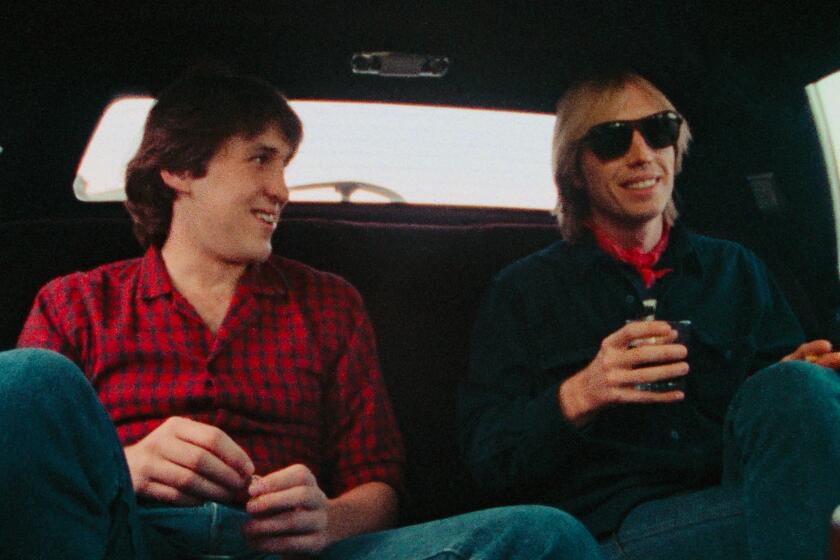Denis’ Stylized ‘Beau Travail’ Mixes Eroticism and Ritual
With “Beau Travail” (Good Work) Claire Denis transposes, with her customary finesse, Herman Melville’s “Billy Budd” to present-day Djibouti, a small East African nation on the Gulf of Aden. Formerly French Somaliland, it still hosts a small French Foreign Legion outpost. A ruggedly beautiful landscape of desert and sea provides a dramatic setting for a psychological drama told with the utmost rigor--and unabashed eroticism.
Life at the outpost is ritualized in the extreme. A contingent of 15 young men spend their days in calisthenics, on maneuvers or in training, or in preparing meals and washing and ironing their uniforms. At nights they head for a local disco. The men are put through their paces by the resolute, perfectionist Chief Master Sgt. Galoup (Denis Lavant), a dedicated careerist although not much older than his men.
Galoup has a girlfriend, the most beautiful in the disco, Rahel (Marta Tafesse Kassa), and a commandant, the mature and worldly Bruno Forestier (Michel Subor), he admires. (Significantly, Subor played a character of the same name in Godard’s controversial 1963 Algerian War commentary, “Le Petit Soldat.”)
“Beau Travail” unfolds as a flashback, a story told by Galoup, a man who had found the ideal world for himself but who in retrospect decides he is also a man who stayed away from France too long.
That world starts unraveling with the arrival of Gilles Sentain (Gregoire Colin), a tall, self-possessed 22-year-old. Gilles fits in immediately with the other young men, but Galoup feels Gilles does not belong--that he will be a source of trouble. The trouble, however, lies entirely within Galoup, who senses that Gilles, for all his impeccable conduct, is not submissive in nature.
Gilles is tall, with a striking profile whereas Galoup is short and has a gnomish countenance that is not unattractive. There is both strength and a distinctive beauty to Gilles that Galoup clearly finds profoundly threatening. Galoup is most likely a repressed homosexual in the throes of denial, but Gilles’ serene presence would intimidate a brooding loner like Galoup in any event. Understatement and subtlety key all the performances, and Denis’ actors suggest much complexity with minimal dialogue.
All sorts of meanings could be read into “Beau Travail,” but the one thing Denis, whose childhood was in French Colonial Africa, makes clear is that there doesn’t seem much point to the legionnaires’ sweaty regimen, a source of amusement to the locals. There’s not an ounce of body fat among the entirety of the young legionnaires, and Denis does celebrate the physical perfection of the young men as they exercise. (They do their ironing with the same precision, to amusing effect.) “Beau Travail” is a work of deliberate and subversive sensuality that suggests a hollowness to all this furious activity. You sense that it’s being performed in the name of an imperial grandeur that has passed.
Denis most effectively draws upon the images of cinematographer Agnes Godard and Eran Tzur’s original score, which incorporates passages from Benjamin Britten’s “Billy Budd” and even “Rhythm of the Night.” “Beau Travail,” which unfolds like a ballet, represents the most stylized and venturesome film to date from the masterful director of “Chocolat,” “I Can’t Sleep” and “Nenette and Boni.”
* Unrated. Times guidelines: adult themes.
‘Beau Travail’
Denis Lavant: Galoup
Michel Subor: Bruno Forestier
Gregoire Colin: Gilles Sentain
Marta Tafesse Kassa: Rahel
A New Yorker Films release. Director Claire Denis. Executive producer Jerome Minet. Screenplay Denis, Jean-Pol Fargeau. Cinematographer Agnes Godard. Editor Nelly Quetier. Music Charles Henry de Pirrefeu. Original score Eran Tzur. Production designer Arnaud de Moleron. In French, with English subtitles. Running time: 1 hour, 34 minutes.
Exclusively at the Nuart through Thursday, 11272 Santa Monica Blvd., West Los Angeles, (310) 478-6379.
More to Read
Only good movies
Get the Indie Focus newsletter, Mark Olsen's weekly guide to the world of cinema.
You may occasionally receive promotional content from the Los Angeles Times.










